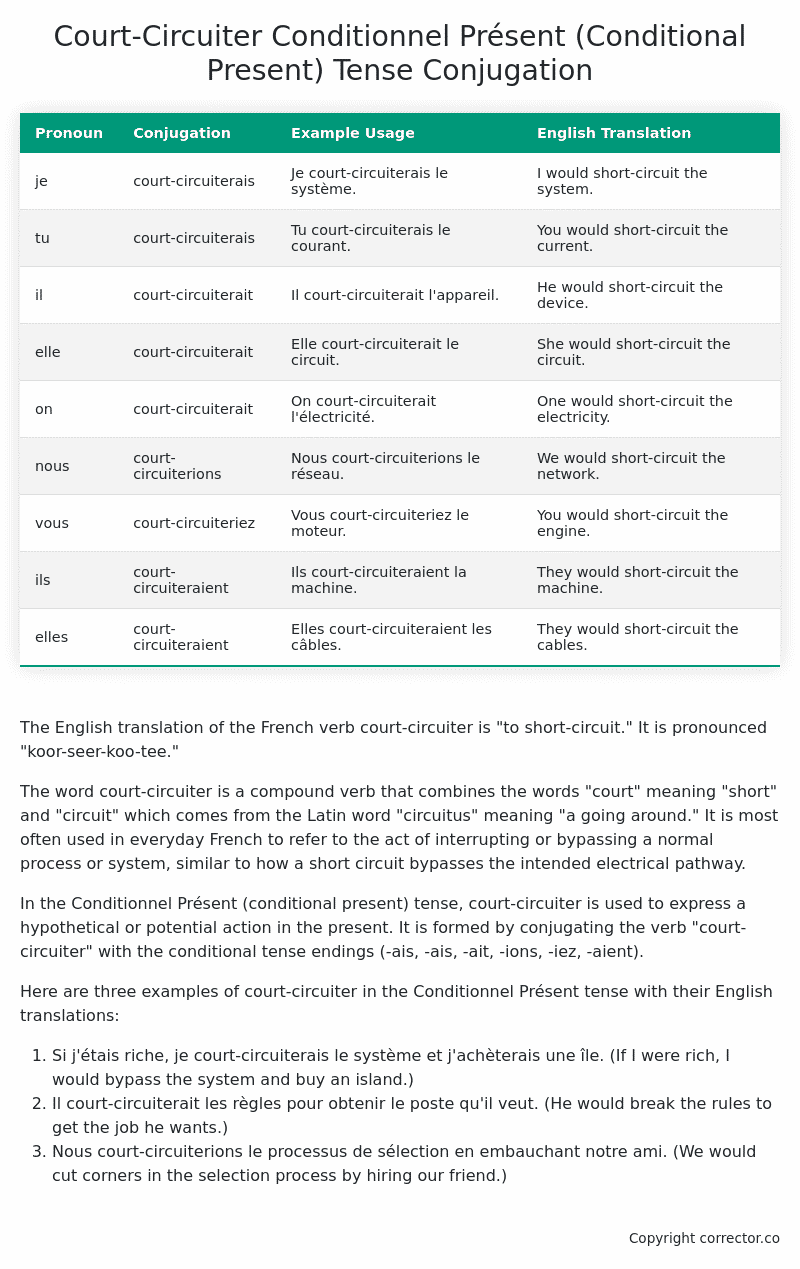Conditionnel Présent (Conditional Present) Tense Conjugation of the French Verb court-circuiter
Introduction to the verb court-circuiter
The English translation of the French verb court-circuiter is “to short-circuit.” It is pronounced “koor-seer-koo-tee.”
The word court-circuiter is a compound verb that combines the words “court” meaning “short” and “circuit” which comes from the Latin word “circuitus” meaning “a going around.” It is most often used in everyday French to refer to the act of interrupting or bypassing a normal process or system, similar to how a short circuit bypasses the intended electrical pathway.
In the Conditionnel Présent (conditional present) tense, court-circuiter is used to express a hypothetical or potential action in the present. It is formed by conjugating the verb “court-circuiter” with the conditional tense endings (-ais, -ais, -ait, -ions, -iez, -aient).
Here are three examples of court-circuiter in the Conditionnel Présent tense with their English translations:
- Si j’étais riche, je court-circuiterais le système et j’achèterais une île. (If I were rich, I would bypass the system and buy an island.)
- Il court-circuiterait les règles pour obtenir le poste qu’il veut. (He would break the rules to get the job he wants.)
- Nous court-circuiterions le processus de sélection en embauchant notre ami. (We would cut corners in the selection process by hiring our friend.)
Table of the Conditionnel Présent (Conditional Present) Tense Conjugation of court-circuiter
| Pronoun | Conjugation | Example Usage | English Translation |
|---|---|---|---|
| je | court-circuiterais | Je court-circuiterais le système. | I would short-circuit the system. |
| tu | court-circuiterais | Tu court-circuiterais le courant. | You would short-circuit the current. |
| il | court-circuiterait | Il court-circuiterait l’appareil. | He would short-circuit the device. |
| elle | court-circuiterait | Elle court-circuiterait le circuit. | She would short-circuit the circuit. |
| on | court-circuiterait | On court-circuiterait l’électricité. | One would short-circuit the electricity. |
| nous | court-circuiterions | Nous court-circuiterions le réseau. | We would short-circuit the network. |
| vous | court-circuiteriez | Vous court-circuiteriez le moteur. | You would short-circuit the engine. |
| ils | court-circuiteraient | Ils court-circuiteraient la machine. | They would short-circuit the machine. |
| elles | court-circuiteraient | Elles court-circuiteraient les câbles. | They would short-circuit the cables. |
Other Conjugations for Court-Circuiter.
Le Present (Present Tense) Conjugation of the French Verb court-circuiter
Imparfait (Imperfect) Tense Conjugation of the French Verb court-circuiter
Passé Simple (Simple Past) Tense Conjugation of the French Verb court-circuiter
Passé Composé (Present Perfect) Tense Conjugation of the French Verb court-circuiter
Futur Simple (Simple Future) Tense Conjugation of the French Verb court-circuiter
Futur Proche (Near Future) Tense Conjugation of the French Verb court-circuiter
Plus-que-parfait (Pluperfect) Tense Conjugation of the French Verb court-circuiter
Passé Antérieur (Past Anterior) Tense Conjugation of the French Verb court-circuiter
Futur Antérieur (Future Anterior) Tense Conjugation of the French Verb court-circuiter
Subjonctif Présent (Subjunctive Present) Tense Conjugation of the French Verb court-circuiter
Subjonctif Passé (Subjunctive Past) Tense Conjugation of the French Verb court-circuiter
Subjonctif Imparfait (Subjunctive Imperfect) Tense Conjugation of the French Verb court-circuiter
Conditionnel Présent (Conditional Present) Tense Conjugation of the French Verb court-circuiter (this article)
Conditionnel Passé (Conditional Past) Tense Conjugation of the French Verb court-circuiter
L’impératif Présent (Imperative Present) Tense Conjugation of the French Verb court-circuiter
L’infinitif Présent (Infinitive Present) Tense Conjugation of the French Verb court-circuiter
Struggling with French verbs or the language in general? Why not use our free French Grammar Checker – no registration required!
Get a FREE Download Study Sheet of this Conjugation 🔥
Simply right click the image below, click “save image” and get your free reference for the court-circuiter Conditionnel Présent tense conjugation!

Court-Circuiter – About the French Conditionnel Présent (Conditional Present) Tense
Formation
Common Everyday Usage Patterns
Expressing Polite Requests
Expressing Hypothetical Situations
Expressing Doubt or Uncertainty
Interactions with Other Tenses
Present Tense
Past Tense
Future Tense
Conditional Perfect
Summary
Want More?
I hope you enjoyed this article on the verb court-circuiter. Still in a learning mood? Check out another TOTALLY random French verb conjugation!


